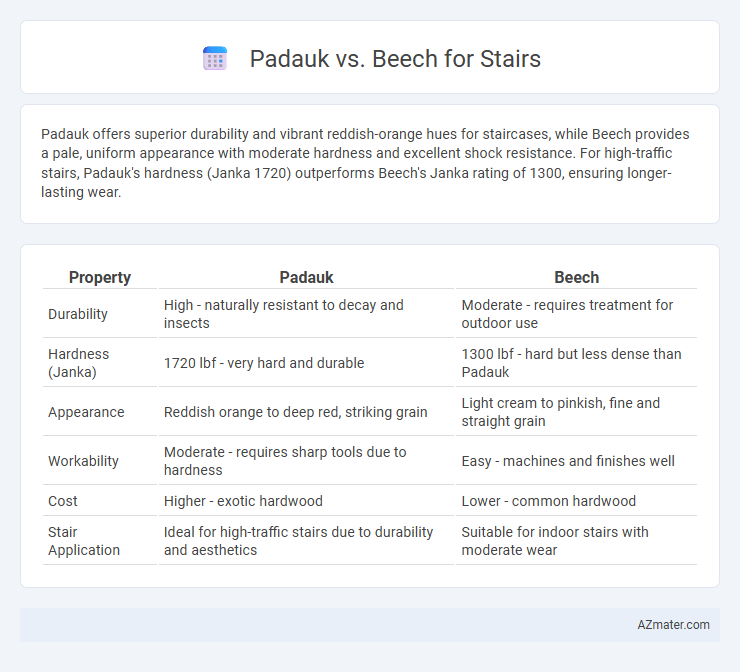Padauk offers superior durability and vibrant reddish-orange hues for staircases, while Beech provides a pale, uniform appearance with moderate hardness and excellent shock resistance. For high-traffic stairs, Padauk's hardness (Janka 1720) outperforms Beech's Janka rating of 1300, ensuring longer-lasting wear.
Table of Comparison
| Property | Padauk | Beech |
|---|---|---|
| Durability | High - naturally resistant to decay and insects | Moderate - requires treatment for outdoor use |
| Hardness (Janka) | 1720 lbf - very hard and durable | 1300 lbf - hard but less dense than Padauk |
| Appearance | Reddish orange to deep red, striking grain | Light cream to pinkish, fine and straight grain |
| Workability | Moderate - requires sharp tools due to hardness | Easy - machines and finishes well |
| Cost | Higher - exotic hardwood | Lower - common hardwood |
| Stair Application | Ideal for high-traffic stairs due to durability and aesthetics | Suitable for indoor stairs with moderate wear |
Introduction to Padauk and Beech Stair Materials
Padauk is a dense hardwood known for its vibrant reddish-orange hues and exceptional durability, making it ideal for stair treads and risers that require both strength and aesthetic appeal. Beech wood features a fine, tight grain with a light cream to reddish-brown color, prized for its hardness and shock resistance, providing a smooth and uniform surface ideal for stair construction. Both materials offer robust performance for stairs, with Padauk favored for striking color and longevity, while Beech is valued for its subtle elegance and wear resistance.
Appearance and Color Differences
Padauk staircases boast a striking reddish-orange hue that deepens to a rich, dark red over time, creating a bold and exotic appearance. Beech features a more subdued and uniform light tan or pale cream color with occasional pink or brown tones, offering a classic and understated look. The contrasting grain patterns also set them apart: Padauk has a coarse, interlocked grain with a natural luster, while Beech exhibits a fine, straight grain with a smooth texture.
Grain Patterns and Texture Comparison
Padauk features bold, striking grain patterns with deep reddish-orange hues and a coarse, interlocking texture that enhances stair visual appeal and wear resistance. Beech displays fine, straight grain with a uniform pale cream color and a smooth, tight texture that offers a clean, consistent look for stair surfaces. The distinct grain complexity of Padauk provides a dramatic aesthetic, while Beech's subtle texture ensures versatility and ease of finishing in stair applications.
Strength and Durability: Padauk vs Beech
Padauk offers exceptional strength and durability, making it highly resistant to wear, dents, and moisture, which is ideal for high-traffic stairs. Beech is a strong hardwood known for its tight grain and shock resistance, but it is less resistant to moisture and can wear faster under heavy use. For stair applications requiring long-term resilience and minimal maintenance, Padauk typically outperforms Beech in both strength and durability metrics.
Workability and Ease of Installation
Padauk offers excellent workability with its fine grain and natural oils, making it resistant to splitting and easy to machine for stair components. Beech wood is also favored for staircases due to its uniform texture and hardness, providing smooth sanding and reliable fastening without excessive effort. Both woods facilitate efficient installation, but Padauk's durability and natural resistance to wear may reduce the need for frequent adjustments during fitting.
Resistance to Wear, Rot, and Insects
Padauk exhibits exceptional resistance to wear, making it ideal for high-traffic stair treads due to its dense, durable grain structure. Beech, while moderately durable, is more susceptible to wear over time and requires more maintenance to preserve its surface integrity. In terms of rot and insect resistance, Padauk outperforms Beech significantly, as its natural oils provide strong protection against decay and pest infestation, whereas Beech lacks these properties and is prone to damage in moist or insect-prone environments.
Maintenance and Long-Term Care Needs
Padauk stairs require minimal maintenance due to their natural resistance to decay and insects, often needing just regular cleaning and occasional oiling to maintain their vibrant reddish hue. Beech stairs demand more frequent care, including sanding and refinishing, as their lighter color shows wear and can be more susceptible to dents and moisture damage over time. Long-term care for Padauk involves periodic reapplication of protective finishes to preserve durability, whereas Beech benefits from vigilant moisture control and prompt repair of surface scratches to extend lifespan.
Cost Comparison: Padauk and Beech
Padauk stairs typically cost more than Beech stairs due to Padauk's exotic status and limited availability, with prices ranging from $15 to $25 per board foot compared to Beech's $5 to $10. Beech offers a more budget-friendly option as a domestic hardwood, providing durability and ease of maintenance at lower prices. The cost difference reflects Padauk's vibrant reddish-orange color and superior hardness, influencing both material expense and installation charges.
Environmental Impact and Sustainability
Padauk wood is prized for its rapid growth rate and lower environmental impact, making it a more sustainable choice for stair construction compared to Beech. Beech trees grow more slowly and often require more intensive forest management practices, which can increase carbon emissions and habitat disruption. Choosing Padauk contributes to reduced deforestation and supports sustainable forestry initiatives due to its efficient regeneration and certified sourcing.
Best Applications: Choosing Between Padauk and Beech for Stairs
Padauk wood excels in staircases requiring vibrant color and exceptional durability, making it ideal for high-traffic areas due to its natural resistance to wear and decay. Beech, with its fine grain and smooth finish, suits staircases where a classic, light-toned appearance and ease of machining are prioritized, offering good stability and moderate hardness. For applications demanding bold aesthetics and robustness, Padauk is the best choice, while Beech is preferred for traditional, finely finished staircase designs in controlled indoor environments.

Infographic: Padauk vs Beech for Stair
 azmater.com
azmater.com